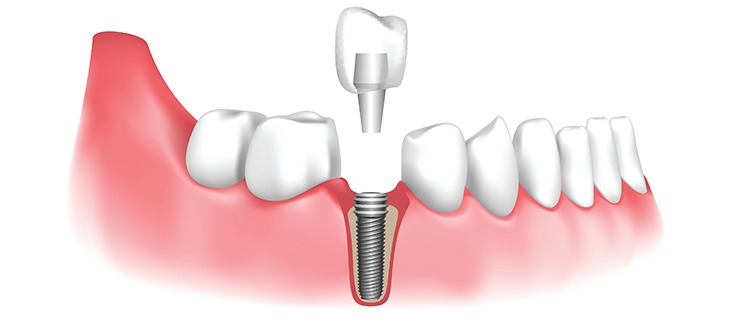Modern Boon To Tooth Loss:
DENTAL IMPLANT:-
Tooth loss is a common issue that affects many people at some point in their lives. It can result from various factors, including decay, trauma, or gum disease. Fortunately, advancements in dental technology have provided effective solutions to address this problem, with dental implants being one of the most promising options.
What Are Dental Implants?
Dental implants are artificial tooth roots made of biocompatible materials, typically titanium, which are surgically placed into the jawbone. They serve as a sturdy foundation for attaching replacement teeth, such as crowns or dentures. Unlike traditional dentures or bridges, implants provide a more permanent and natural-looking solution.
The Dental Implant Procedure:-
1. Consultation -The process begins with a thorough examination by a dentist or oral surgeon. This includes X-rays and possibly a CBCT scan to assess bone density and determine the best placement for the implant.
2. Implant Placement – During a surgical procedure, the implant is inserted into the jawbone. This step requires a healing period of 6-8 weeks to allow the bone to integrate with the implant, a process known as osseointegration.
3. Abutment Placement -Once the implant has fully integrated with the bone, an abutment a small connector piece is attached to the implant. This will hold the final prosthetic tooth.
4. Crown Attachment:-Finally, a custom-made crown is fixed to the abutment. This crown is designed to match the appearance of natural teeth, providing a seamless and aesthetically pleasing result.
-Benefits of Dental Implants:-
1. Natural Look and Feel:-Implants are designed to resemble natural teeth in appearance and function, making them an excellent choice for those seeking a realistic and comfortable solution.
2. Durability: With proper care, dental implants can last for decades, offering a long-term solution compared to traditional dentures or bridges.
3. Bone Preservation: Implants help preserve the jawbone by stimulating bone growth, which can prevent the bone loss that often occurs with missing teeth.
4. Improved Functionality: Unlike removable dentures, implants are fixed and do not shift, allowing for improved chewing and speaking.
5. No Impact on Adjacent Teeth: Implants do not require alteration of neighboring teeth, unlike dental bridges, which rely on adjacent teeth for support.
*Considerations and Risks
While dental implants offer numerous benefits, they may not be suitable for everyone. Factors such as insufficient bone density, uncontrolled medical conditions, uncontrolled Diabetes or poor oral hygiene can impact the success of the implant. It’s essential to consult with a qualified dental professional to determine if implants are the right choice for you.
*Maintenance and Care
Maintaining dental implants is similar to caring for natural teeth. Regular brushing, flossing, and dental check-ups are crucial for ensuring the longevity of your implants. Proper care can prevent issues such as peri-implantitis, an inflammatory condition that affects the tissue around the implant.
*Conclusion
Dental implants have revolutionized the field of restorative dentistry, offering a reliable and aesthetically pleasing solution for tooth loss. By providing a natural look and feel, durability, and improved functionality, implants can significantly enhance your quality of life. If you’re considering dental implants, consult with a dental professional to explore your options and determine the best treatment plan for your needs.
Thankyou Keep Smiling 🙂

Written By


